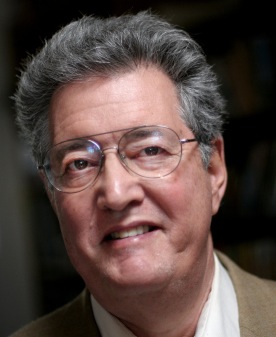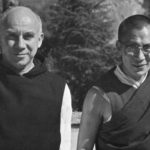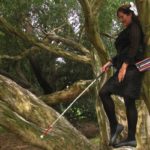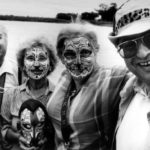Tom Miller has been writing about the American Southwest and Latin America for more than three decades. His nine books include Jack Ruby’s Kitchen Sink (which won a Lowell Thomas Award for “Best Travel Book of the Year in 2001”), The Panama Hat Trail (which follows the making and marketing of one Panama hat, from the straw fields of South America to a hat shop in downtown San Diego) and Trading with the Enemy (which Lonely Planet says “may be the best travel book about Cuba ever written”). More recently, Miller edited Travelers’ Tales: Cuba and Writing on the Edge, a collection of some of the best writing about the U.S.-Mexico border from the last hundred years. Miller began his journalism career in the underground press of the late 1960s and early ‘70s, and has written articles for the New York Times, Washington Post, The New Yorker, Smithsonian, Natural History, and Rolling Stone, among other outlets. He lives in Tucson, Arizona with his wife, Regla.
How did you get started traveling?
I spent most summers of my youth at a boys’ camp in North Carolina’s Blue Ridge Mountains. The trip there, whether by car or train, were exciting, and trips in the area, whether by truck or foot, were exhilarating.
As for combining travel with writing, I started unknowingly. I wrote a book about the U.S.-Mexico border (On the Border, 1981) to test a theory that the border was really a third country between the other two, 2,000 miles long and 20 miles wide. I traveled the entire length of the border, cross-crossing it innumerable times getting a feel for border life from the inside out rather than looking at it from the outside. When the book came out many reviews referred to it as travel literature. I didn’t set out to be a “travel writer” and have some misgivings about the name still, though I’ve adjusted to it pretty well.
How did you get started writing?
By reading! My Dad was an insufferable newspaper reader. We’d get two of three local Washington DC papers, plus at least one New York paper daily. Home bookshelves were full. I was swimming in words, but of course didn’t realize it until I got out of the pool. I wrote for the occasionally-published high school newspaper, and during the five semesters I attended college I worked my way up to acting editor-in-chief of the school’s weekly. This was about the time that underground papers were on the ascent, and politically and culturally they appealed to me mightily. The anti-war movement was thriving, but our pamphlets, announcements, proclamations, and flyers were just terribly written. One day I was in the office of an anti-war group looking at its most recent mish-mashed flyer, and I muttered, “I can do better than that.” Oh yeah? someone said. Here. And he put his chair next to a typewriter and told me to go at it.
Which I did, for a number of years. Underground press. Sea level publications. Higher profile rags. Classy mags and dailies. Eventually books.
What do you consider your first “break” as a writer?
The breaks don’t come chronologically, even if they are sequential. I’d written a short piece in 1972 for SunDance, a brilliant, beautiful magazine brought out by the best and most creative drug-addled minds in the underground press. The mag was underwritten by John Lennon. Editorially and graphically it was terrific; the staff had no business sense and it folded after three issues. In any event, I wrote a short piece about a small-town Texas auction in which all of the effects from Jack Ruby’s Carousel Club were on the block. A week or so after publication, I got a call from an editor at Esquire who had read the piece, and he said, “Oh by the way, how much did SunDance pay you for that?” Slightly embarrassed, I said, Oh, “$15 – if they ever send it.” “We would have bought that piece for $750,” Mr. Esquire said. “Would you like to write for us?” Eventually we found a subject agreeable to them and me, and I wrote a piece for a significant rag.
Another first “break” — getting a literary agent, which I got in the best way possible – he found me, I didn’t find him. I’d written a black humor piece about the Kennedy assassination for Crawdaddy in 1975, and an agent wrote that he thought he’d seen every way there was to write about the assassination, but this was something else again. The letter is long-since lost, but I recall, word for word, the final sentence: “If you’d be interested in expanding that piece into a book, I’d be pleased to represent you.” I was, he did, and it became my first book – nothing to do with travel – and he represented me for the next 25 years.
As a traveler and fact/story gatherer, what is your biggest challenge on the road?
On the road challenges; few if any. Just about all the hardships have to do with editorial or family matters. The editor wants something that curves around the truth. Family and household responsibilities limit your time. In other words, reality. I keep electronic paraphernalia to an absolute minimum. No camera, no recording device, no laptop, none of this palm pilot nonsense or a cell phone. Paper and pencil, a book, maybe a bilingual dictionary. Anything beyond that (a) can be stolen, and (b) intimidates people you encounter. The more double-A batteries you carry, the more you distance yourself from the people you’re writing about.
What is your biggest challenge from a business standpoint? Editors? Finances? Promotion?
Promotion if it’s a book. Finances and editors if it’s a magazine I’m writing for. Writing is not a get-rich quick scheme, but I do like to break even by the end of research, travel, and writing.
Have you ever done other work to make ends meet?
Just about all the other work is derivative of writing. Giving talks. Teaching at workshops. Free-lance editing. I’ve led tours of Cuba on behalf of the National Geographic Society and the American Museum of Natural History. Until I got married I had an extremely low cost of living, with dirt cheap rent in my resplendent bachelor hovel, so I could live on writing more easily. When I moved to Tucson in 1969 I got a job selling Encyclopedia Britannica door-to-door. I sold one set in four weeks and quit. I also worked as the grave-yard shift janitor at a meat-packing plant for a short while, cleaning up the gunk that had accumulated on the floors and hooks and in the freezers. I was fired after four weeks — there’s something about the four-week mark — and I don’t blame them. I was a lousy grave-yard shift janitor.
What travel authors or books might you recommend and/or have influenced you?
Anything by Moritz Thomsen, the great American expat writer of the twentieth century. Travel poetry (at least that’s what I call it) by John Brandi. I do like Paul Theroux’s writing a great deal, and last year when I spent a month in Africa, his Dark Star Safari accompanied me. An Ethiopian grabbed it from me to read about his country, ready to denounce yet another innocent imperialist getting it all wrong, but he broke into a grin as he read, then jabbed the pages, saying, “He got it! He got it right!”
You can find “travel writing” — whatever that is — in a good book on economics, in a book about dance or sports or theater or agrarian dilemmas of Central Asia. It’s these unexpected finds that appeal most to me.
What advice and/or warnings would you give to someone who is considering going into travel writing?
Don’t use the word “locals.” It’s condescending.
Don’t call yourself a travel writer. It’s pretentious. Let someone else do that.
Keep first-person references to a minimum, then cut more from your manuscript. The fewer times you refer to yourself, the more you’re in control.
Always unpack from your last trip before you pack for your next.
Read up on the history of the place you’re going. That may sound a tad obvious, but the editor of a major monthly once told me that her contributors either had spent an inordinate amount of time researching a subject or else they winged it without a second thought. I’m obviously of the former school. I usually have to go back to a place at least once more before I write about it, but this obsession is sometimes impractical and for some, unnecessary. It’s also the reason I do so little magazine work these days.
Finally: pack as few conceptions — pre, mal, and mis — as possible. Leave your goals on the soccer field.
What is the biggest reward of life as a travel writer?
Intellectually, seeing seemingly disparate situations clicking into some overall pattern. I was in Oyo (o-YO), a Yoruba town in Nigeria a short while back. It’s said to have a population of 250,000, but it’s really a series of interconnected small villages, each with its own marketplace. Watching people go from one village to the next to get their daily supplies for work and home, made the more intimate observations — deportment, eating habits, conversation, clothes — far more relevant. I recall one evening in Manta, in the Ecuadoran province of ManabÌ, after months of research on The Panama Hat Trail, feeling relieved that at last, all the pieces of the puzzle snapped into place. It was an evening to celebrate with aguardiente. Also, while living in Havana for eight months I met my future wife. How rewarding is that?





